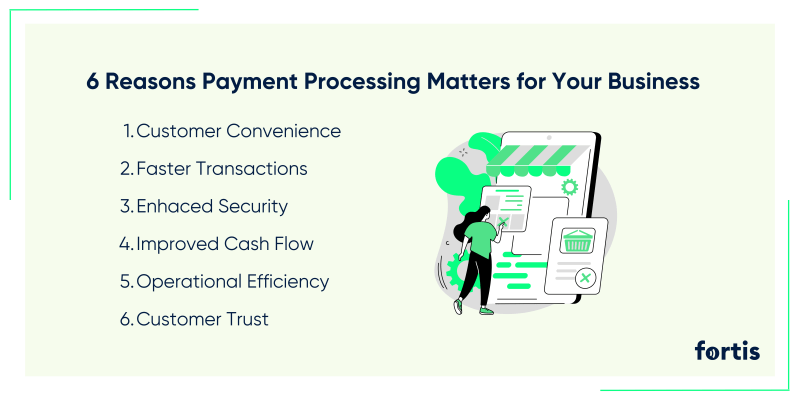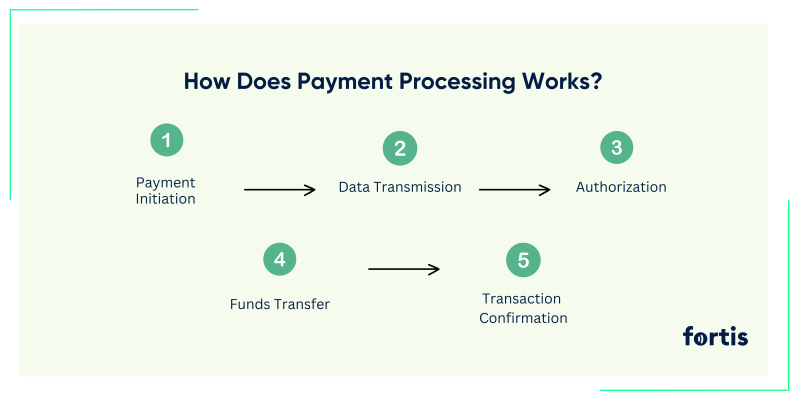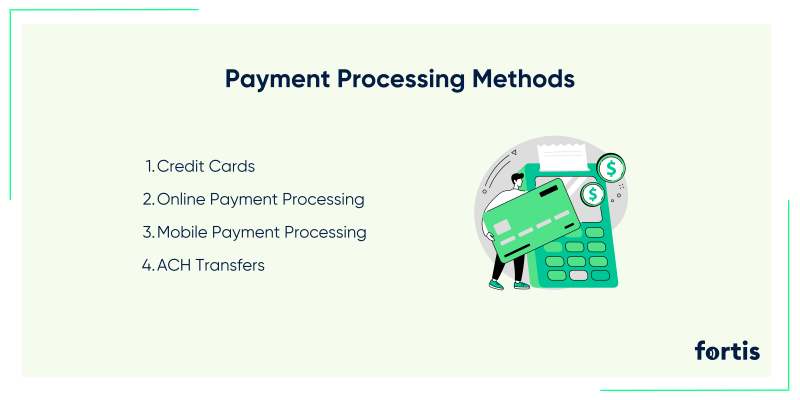Table of Contents
Global digital payments are expected to reach US$11.53 tn in 2024. The figure shows how important it is for businesses of all sizes to offer different payment processing options to their customers, especially in the UAE economy, where most customers prefer not to carry cash with them. In this guide, we’ll walk you through everything you need to know about payment processing, so you are informed enough to make the best decision for your business.
What is Payment Processing?
[[cta_center]]
[[cta_left]]
[[cta_smartpos]]
[[cta_tablepay]]
Payment processing is the broad term for the systems that handle the transfer of funds from a customer’s account to your business following a sale. The method of payment may vary between credit cards, debit cards, and online payment gateways, but in general, an effective system authorizes, validates, and settles your transaction securely.
The rise of online shopping has made seamless and secure payment options essential. Consumers expect a smooth checkout experience and an effective payment processing method allows businesses to offer secure and complete payment solutions to their customers.
Six Reasons Payment Processing Matters for Your Business

If you have a small or growing business, having an efficient and secure payment processing solution is a must. The right payment processing system offers stability by assuring that you get paid quickly and securely, but it also plays a crucial role in maintaining customer satisfaction, enhancing operational efficiency, and even driving business growth.
Here’s why choosing the right payment processing solution can give your business a competitive edge:
- Customer Convenience: Today,’s customers expect a seamless payment experience, whether they are shopping online, in-store , or through a mobile app. Offering multiple payment processing options—such as credit cards, debit cards, mobile wallets, and even ACH payments—ensures that customers can choose their preferred method. By providing flexibility in how payments are made, you reduce friction during the checkout process, leading to higher customer satisfaction and increased sales.
- Faster Transactions: A well-integrated payment processing system can handle transactions within seconds and allows , allowing you to serve customers faster, reduce wait times, and improve overall service. You can do it through a This can be through a physical point-of-sale (POS) system or an online payment gateway. Speedy transactions are part of a smooth shopping experience and keep customers coming back and spending.
- Enhanced Security: A reliable payment processing solution provides built-in security features, such as encryption, tokenization, and fraud detection tools, to protect both your business and your customers. These tools help minimize the risk of chargebacks and fraudulent transactions, safeguarding your revenue and maintaining customer trust. Ensuring compliance with security standards like PCI DSS (Payment Card Industry Data Security Standard) adds another layer of protection for sensitive payment data.
- Improved Cash Flow: One of the most significant advantages of a good payment processing system is the impact it has on your cash flow. Prompt processing of payments means funds are transferred into your business account without unnecessary delays, helping your liquidity. For small businesses, this is particularly important as steady cash flow is key to covering expenses, paying suppliers, and investing in growth opportunities. The faster you get paid, the better you can manage your finances and focus on scaling your business.
- Operational Efficiency: Beyond processing payments, the right payment processing system can automate and streamline several aspects of your financial operations. From reconciling transactions to generating detailed financial reports, an efficient system reduces the time and effort required to manage your accounts and . This allows you to focus more on serving customers and growing your business rather than getting bogged down in the books.
- Customer Trust: Offering a secure and seamless payment experience not only benefits your bottom line but also builds trust with your customers. When customers know their payment information is being handled securely, they are more likely to complete purchases and return in the future. Easy and secure payment methods are vital to your reputation as a professional and reliable business.
RECOMMENDED READING
What Is An Omnichannel Retail Strategy & Why Does It Matter For Small Businesses?
[[cta_smartpos]]
Components of Payment Processing
To fully understand how payment processing works, it’s important to know the key components that come into play during each transaction. A comprehensive payment processing system simplifies this complex process by managing the following elements for you:
Every component plays a crucial role in providing you with a reliable and efficient payment processing system.
How Does Payment Processing Work?

When a customer makes a purchase, your online payment processing system kicks into action to ensure the transaction is completed successfully. Here’s how it works:
- Payment Initiation: A customer provides their payment method (e.g., credit card) at the point of sale or on your website.
- Data Transmission: The payment gateway encrypts and transmits the transaction details to the payment processor.
- Authorization: The payment processing system sends the request to the customer’s issuing bank for verification. The issuing bank approves or declines the transaction based on the available funds.
- Funds Transfer: Once approved, the issuing bank transfers the funds to your acquiring bank, and your payment processor ensures that the money is deposited into your merchant account.
- Transaction Confirmation: Both you and your customer receive confirmation that the transaction has been completed successfully.
The entire process happens in seconds, ensuring quick, secure, and hassle-free transactions every time.
Payment Processing Methods

Facilitating appropriate payment methods for your business is key to meeting customer expectations and boosting sales. You can choose from a variety of payment methods to suit your business’s needs:
- Credit Card Payment Processing: The most widely used method makes it easy for your customers to pay using credit or debit cards, either in person or online.
- Online Payment Processing: Quick processing through secure payment gateways allows customers to easily pay through your website.
- Mobile Payment Processing: Mobile wallets, like Apple Pay and Google Pay, allow your customers to make quick, contactless payments through smartphones.
- ACH Transfers: Automated Clearing House (ACH) payments allow customers to transfer funds directly from their bank accounts, ideal for recurring payments.
Make sure you select a flexible and scalable payment processing solution that allows you to accept payments in whichever way your customers prefer.
Understanding Fees
While payment processing systems are essential, it’s important to be aware of the associated costs, so look for transparent and competitive pricing to ensure you know exactly what you’re paying for.
Common Fees:
- Transaction Fees: A small percentage of each sale, typically between 1.5% and 3%.
- Monthly Fees: Some solutions charge a monthly subscription fee for access to their platform.
- Setup Fees: One-time setup fees may apply when integrating into your business systems.
- Chargeback Fees: Fees are incurred when a customer disputes a transaction, which is an occurrence that can be minimized through robust fraud prevention tools.
Key Takeaways
- Fortis offers competitive rates and customizable solutions that suit both in-person and online transactions, making it ideal for businesses that need flexibility. Their ACH fees are also competitive., similar to Stripe.
- Stripe is known for its developer-friendly API and wide range of payment methods, but you businesses should be prepared for higher chargeback fees.
- Square provides a full ecosystem for small businesses, though its fees for keyed-in and online transactions are similar to others.
- PayPal tends to have higher fees for online transactions and chargebacks, making it pricier for online-focused businesses, but it is popular due to its international reach.
Each provider offers a unique set of features, so choosing the right one depends on your business model, volume of transactions, and whether your focus is on in-person or online sales.
Best Practices for Payment Processing
To get the most out of your payment processing system, follow their best practices for operation within your business. Top of the list, security must always be a priority. Ensure that your system adheres to the Payment Card Industry Data Security Standard (PCI DSS), which is critical for protecting your customers’ sensitive payment information from potential fraud or breaches.
Providing a variety of payment options is essential to meeting customer expectations. Your system should support a wide range of payment methods, including credit cards, mobile payments like Apple Pay and Google Pay, and ACH transfers. This flexibility makes it convenient for customers to complete transactions. Making sure you monitor your transactions is another crucial step. Avail of real-time tracking tools that allow you to keep a close watch on payments, helping you detect any unusual activity or potential fraud as soon as it happens.
Lastly, setting clear refund and chargeback policies can prevent disputes and help avoid unnecessary fees. Your payment processing provider can help you establish these policies, ensuring transparency with your customers and reducing the chances of conflicts that could hurt your business.
Choose Fortis as Your Payment Processing Partner
Understanding the importance of getting payment processing right is crucial for the success of your business, and choosing the optimal partner can make all the difference. With Fortis, you can easily start accepting payment online. You can either send a payment link, or you can set up your online catalog and allow customers to shop online without setting up a website.
Fortis is a SmartPOS software that converts your ordinary card machine into a fully-functioning POS system. With Fortis, you can accept orders and process payments from a single device, without investing into hardware. To see firsthand how it can help you improve your customer experience, increase retention and boost sales, book a demo today!




.svg)


















